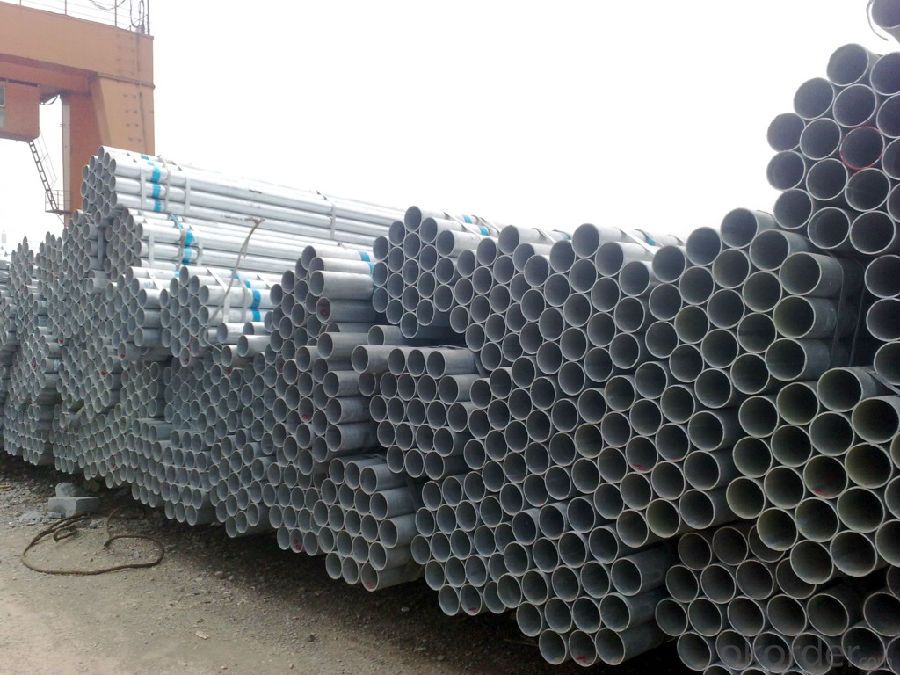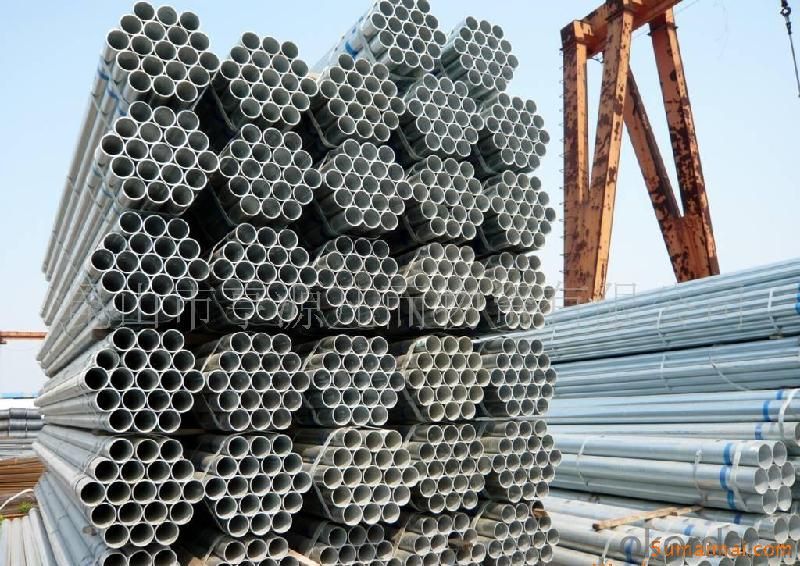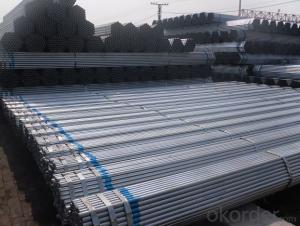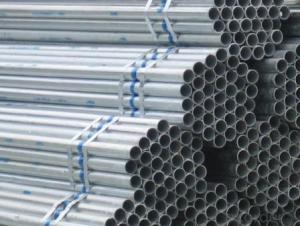Hot Dipped Galvanized Steel Pipe GB3091
- Loading Port:
- Tianjin
- Payment Terms:
- TT OR LC
- Min Order Qty:
- 25 m.t.
- Supply Capability:
- 7000 m.t./month
OKorder Service Pledge
OKorder Financial Service
You Might Also Like
1、Structure of Hot Dipped Galvanized Steel Pipe GB3091 :
The surface of Hot Dipped Galvanized Steel Pipe GB3091 can increase the corrosion resistance of the steel tube, prolong service life. Galvanized pipe is widely used, in addition to water, gas, oil and other general low pressure fluid pipelines. It is also used in the petroleum industry, especially for offshore oil field of oil well pipe and oil pipe, chemical, coking equipment of oil heater, condensation cooler, coal run oil exchanger tube, and trestle pile, the mine tunnel support frame tube.
2、Main Features of Hot Dipped Galvanized Steel Pipe GB3091 :
• High manufacturing accuracy
• High strength
• Good visual effect
• Reasonable price
• Small inertia resistance
• Strong heat dissipation ability
3、Hot Dipped Galvanized Steel Pipe GB3091 Specification:
Standard | GB, DIN, ASTM ASTM A106-2006, ASTM A53-2007 |
Grade | 10#-45#, 16Mn 10#, 20#, 45#, 16Mn |
Thickness | 1 - 33 mm |
Section Shape | Round |
Outer Diameter | 21 - 610mm |
Place of Origin | Tianjin, China (Mainland) |
Secondary Or Not | Non-secondary |
Application | Hydraulic Pipe |
Technique | Cold Drawn |
Certification | API |
Surface Treatment | factory state or painted black |
Special Pipe | API Pipe |
Alloy Or Not | Non-alloy |
Length | 5-12M |
Outer Diameter | 21.3-610mm |
Grade | 20#, 45#, Q345, API J55, API K55, API L80, API N80, API P110, A53B |
Standard | ASME, ASTM |
1) Material:20#(ASTM A 106/A53 GRB.API5LGRB,GB),45#,16Mn,10#.
2) Specification range:OD:21.3-610mm,WT:6-70mm,length:6-12m or according to the requirement of clients.
3) Excutive standards:GB,ASME API5L.ASTM A 106/A53,Despite of the above standards,we can also supply seamless steel pipe with standard of DIN,JIS,and so on,and also develop new products according to the requirements of our clients!
4) Surface:black lacquered,varnish coating or galvanized.
5) Ends:Beveled or square cut,plastic capped,painted.
6) Packing:bundles wrapped with strong steel strip,seaworthy packing.
4、Packaging & Delivery
Packaging Details: | seaworthy package,bundles wrapped with strong steel strip |
Delivery Detail: | 15-30days after received 30%TT |
5、FAQ of Hot Dipped Galvanized Steel Pipe GB3091 :
①How is the quality of your products?
Our products are manufactured strictly according to national and internaional standard, and we take a test
on every pipe before delivered out. If you want see our quality certifications and all kinds of testing report, please just ask us for it.
Guaranteed: If products’ quality don’t accord to discription as we give or the promise before you place order, we promise 100% refund.
②How about price?
Yes, we are factory and be able to give you lowest price below market one, and we have a policy that “ for saving time and absolutely honest business attitude, we quote as lowest as possible for any customer, and discount can be given according to quantity”,if you like bargain and factory price is not low enough as you think, just don’t waste your time.Please trust the quotation we would give you, it is professional one.
③Why should you chose us?
Chose happens because of quality, then price, We can give you both.Additionally, we can also offer professional products inquiry, products knowledge train(for agents), smooth goods delivery, exellent customer solution proposals.Our service formula: good quality+good price+good service=customer’s trust
SGS test is available, customer inspection before shipping is welcome, third party inspection is no problem.
6、 Hot Dipped Galvanized Steel Pipe GB3091 : Images:


- Q:How are steel pipes used in the construction of sewer systems?
- Steel pipes are commonly used in the construction of sewer systems due to their durability and strength. These pipes are used to transport sewage and wastewater from households and businesses to treatment plants or disposal sites. They are resistant to corrosion and can withstand high pressure, making them ideal for underground installations. Additionally, steel pipes can be manufactured in various sizes and lengths, allowing for efficient and cost-effective installation in sewer infrastructure.
- Q:What is the role of steel pipe manufacturers in sustainable development?
- Steel pipe manufacturers play a crucial role in sustainable development by promoting environmental responsibility, resource conservation, and reducing carbon emissions. They contribute to sustainable development by adopting cleaner production techniques, recycling waste materials, and investing in research and development to improve energy efficiency. Additionally, they prioritize worker safety and adhere to stringent quality standards, ensuring the durability and longevity of their products, which further supports sustainable construction practices.
- Q:What is a tight steel tube?
- The tight steel tube is called "galvanized steel pipe with sleeve connection" or "flat pipe of steel metal for electrical installation". JDG. The utility model relates to a novel protective conduit for an electric circuit. The connecting sleeve and the metal accessory are provided with a wire pipeline composed of screw fastening connection technology, and the utility model does not need to do cross grounding, welding and covering, and the appearance is silvery white or yellow.
- Q:Are steel pipes suitable for underground gas lines?
- Indeed, underground gas lines can be effectively constructed using steel pipes. Renowned for their robustness and longevity, steel pipes are a dependable option for distributing gas underground. Their exceptional resistance to external elements, including corrosion and impact, is crucial for upholding the gas system's integrity. Moreover, steel pipes possess the ability to endure high pressure and temperature fluctuations, guaranteeing the secure and efficient transportation of gas beneath the surface. Nonetheless, it is vital to emphasize the significance of adhering to proper installation techniques, such as implementing corrosion protection measures, in order to ensure the steel pipes' durability and prevent any potential leaks or accidents.
- Q:What are the advantages of using steel pipes in plumbing systems?
- There are several advantages of using steel pipes in plumbing systems. Firstly, steel pipes are highly durable and can withstand high levels of pressure, making them suitable for carrying water and other fluids. Additionally, steel pipes are resistant to corrosion, which ensures longevity and prevents leaks. Steel pipes also have a smooth interior surface, which improves water flow and reduces the risk of blockages. Moreover, steel pipes are fire-resistant and do not contribute to the spread of flames, enhancing overall safety. Lastly, steel pipes are environmentally friendly as they are often made from recycled materials and can be recycled again at the end of their lifespan.
- Q:What are the different methods of cleaning steel pipes?
- There are several methods of cleaning steel pipes, including mechanical cleaning, chemical cleaning, and high-pressure water jetting. Mechanical cleaning involves the use of brushes, scrapers, or other abrasive tools to remove dirt and debris from the pipe's surface. Chemical cleaning involves the application of solvents or acids to dissolve tough stains or residues. High-pressure water jetting uses a powerful stream of water to dislodge and remove contaminants from the pipe. These methods can be used individually or in combination depending on the specific cleaning requirements.
- Q:What are the different threading options for steel pipes?
- The different threading options for steel pipes include tapered thread, straight thread, and multiple thread options. Tapered threads are commonly used for pipes that carry fluids or gases under pressure, as they provide a tight seal. Straight threads are used for pipes that require a secure connection but do not need to be sealed tightly. Multiple thread options, such as double and triple threads, are used for high-pressure applications where a stronger connection is needed.
- Q:Can steel pipes be used for swimming pool installations?
- Indeed, swimming pool installations can make use of steel pipes. Renowned for their robustness and power, steel pipes emerge as an apt alternative for both subterranean and aboveground swimming pool plumbing systems. These pipes possess the capacity to endure elevated water pressure and resist the deteriorating impact of pool chemicals. Moreover, steel pipes exhibit resilience against harsh weather conditions and can be effortlessly installed and maintained. Nevertheless, it remains crucial to guarantee appropriate treatment and coating of the steel pipes to avert rust and corrosion.
- Q:What is the difference between steel pipe and PVC conduit?
- Steel pipe is a rigid and durable material commonly used for plumbing and industrial applications. It is made of steel, which provides strength and resistance to high pressure and temperature. On the other hand, PVC conduit is a type of plastic piping that is flexible, lightweight, and non-conductive. It is primarily used for electrical installations, as it offers protection and insulation to the wires. The main difference between steel pipe and PVC conduit lies in their composition, rigidity, and purpose of use.
- Q:How are steel pipes tested for pressure and leakage?
- Steel pipes are tested for pressure and leakage through various methods including hydrostatic testing, pneumatic testing, and ultrasonic testing. Hydrostatic testing involves filling the pipe with water and applying pressure to check for any leaks or weaknesses. Pneumatic testing involves using compressed air instead of water. Ultrasonic testing uses high-frequency sound waves to detect any flaws or defects in the pipe material. These testing methods ensure that steel pipes meet the required standards for pressure and leakage resistance.
1. Manufacturer Overview |
|
|---|---|
| Location | |
| Year Established | |
| Annual Output Value | |
| Main Markets | |
| Company Certifications | |
2. Manufacturer Certificates |
|
|---|---|
| a) Certification Name | |
| Range | |
| Reference | |
| Validity Period | |
3. Manufacturer Capability |
|
|---|---|
| a)Trade Capacity | |
| Nearest Port | |
| Export Percentage | |
| No.of Employees in Trade Department | |
| Language Spoken: | |
| b)Factory Information | |
| Factory Size: | |
| No. of Production Lines | |
| Contract Manufacturing | |
| Product Price Range | |
Send your message to us
Hot Dipped Galvanized Steel Pipe GB3091
- Loading Port:
- Tianjin
- Payment Terms:
- TT OR LC
- Min Order Qty:
- 25 m.t.
- Supply Capability:
- 7000 m.t./month
OKorder Service Pledge
OKorder Financial Service
Similar products
New products
Hot products
Related keywords






























